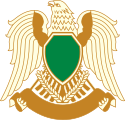
Back مؤتمر الشعب العام Arabic Allgemeiner Volkskongress (Libyen) German Ĝenerala Popola Kongreso de Libio Esperanto Congreso General del Pueblo (Libia) Spanish Herriaren Kongresu Orokorra Basque Congrès général du peuple (Libye) French Muktamar Umum Rakyat ID Congresso generale del popolo Italian Algemene Volkscongres Dutch Powszechny Kongres Ludowy Polish
 |
|---|
The General People's Congress (Arabic: مؤتمر الشعب العام الليبي, Mu'tammar al-sha'ab al 'âmm), often abbreviated as the GPC, was the national legislature of Libya, during the existence of Muammar Gaddafi's Libyan Arab Jamahiriya. It consisted of 2,700 representatives of the Basic People's Congresses (BPC). The GPC was the legislative forum that interacted with the General People's Committee (GPCO), whose members were secretaries of Libyan ministries. It notionally served as the intermediary between the masses and the leadership and was composed of the secretariats of some 600 local "basic popular congresses."
The GPC secretariat and the cabinet secretaries were appointed by the GPC secretary general and confirmed by the annual GPC session. These cabinet secretaries were responsible for the routine operation of their ministries.
The body was established in 1977, upon the adoption of the "Declaration on the Establishment of the Authority of the People".[1] It was headed by the Secretary-General of the General People's Congress.
The People's Hall in Tripoli, where the Congress met, was set on fire in February 2011, during the First Libyan Civil War.[2][3]
- ^ Banks, Arthur S.; Day, Alan J.; Muller, Thomas C. (February 2016). Political Handbook of the World 1998. Springer. ISBN 9781349149513.
- ^ Reuters News
- ^ BBC News; "Libya protests"; 21 February 2011; accessed 02-23-2011